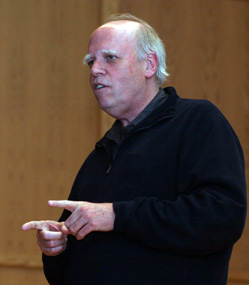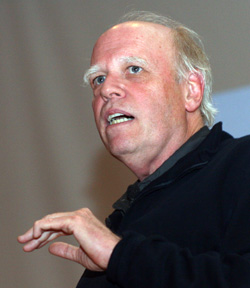Video games have often been looked on as mere distraction for this day and age. Dr. James Gee, Professor of Literacy Studies at Arizona State University and author of What Video Games Have to Teach us About Learning and Literacy as well as Why Video Games are Good For your Soul, however, disagreed in Thursday night's intriguing lecture,"Video Games and 21st Century Learning."
Gee expounded on the virtues of video games, what they mean to today's culture, and what they can teach people about real-life applications.
 Gee began the lecture in a seemingly counter-intuitive manner by focusing on the Greek philosopher Plato. "Plato was one of the West's first truly great writers," Gee said. "He had two major criticisms, though, of writing in general. First, he believed that people learn through dialog, and through interaction, which is something writing is inherently unable to provide. Second, writing can get away from you, it can be interpreted in ways you didn't mean. You can't protect it. I feel that way about my writing at times."
Gee began the lecture in a seemingly counter-intuitive manner by focusing on the Greek philosopher Plato. "Plato was one of the West's first truly great writers," Gee said. "He had two major criticisms, though, of writing in general. First, he believed that people learn through dialog, and through interaction, which is something writing is inherently unable to provide. Second, writing can get away from you, it can be interpreted in ways you didn't mean. You can't protect it. I feel that way about my writing at times."
Gee then went on to speak about the function video games serve which writing is unable to provide: interaction. That, Gee said, is an aspect of today's world which Plato would have loved. "Video games should be like a good conversation; they should talk back and interact with you, and that's how you learn from them."
The widely-renowned Sid Meir's Civilization series is one such game which allows for this conversation between gamer and game. Civilization is a game which places the user at the head of a culture, such as the Greeks, the Chinese, or the Mayans, at its beginning, and forces him or her to make decisions which have social, economic, and military repercussions. The user's goal is to guide the civilization from its beginning, successfully into the future; essentially reinventing history.
"Civilization makes gamers think in a way humanity never has before. You have kids making choices which are absolutely new; they've never had to be made. Do I invest in technology now, or wait 800 years? Historians know that their field is not about what happened, but why it happened. In this game, history can actually be used as a cheat sheet."
However, according to Gee, Plato would certainly not have loved a more contemporary development in video games: modding. Modding, in the context of video games, is the act of changing a game from its original form, and is the shortened, verb form of the word 'modification.' A general example of modding put to use is when a game includes, as one of its features, the program used to create it. Users are then able to utilize the program and add, subtract, or, in other words modify the original game. "Modding produces a culture where creation is as important as consumption" he said. "In Civilization, it isn't how you act out history, it's how you build history."
 Gee went on to explain further ways modding changes not only the experience of a game, but the very thinking of the gamer him or herself. Gee demonstrated this phenomenon with the example of the now infamously best-selling game of all time, The Sims. The game is similar to Civilization, except users control an individual family and not an entire culture. To mod the experience of The Sims and force gamers to think innovatively, one gamer came up with the idea of the 'Nickel and Dimed Challenge.' The challenge is based on the book, Nickel and Dimed, by Barbara Ehrenreich, in which the author attempted to experience life on minimum wage. "The user-created mod takes a book, and translates it into a game" Gee said. "A game can capture the feeling of experience in real life meaningfully."
Gee went on to explain further ways modding changes not only the experience of a game, but the very thinking of the gamer him or herself. Gee demonstrated this phenomenon with the example of the now infamously best-selling game of all time, The Sims. The game is similar to Civilization, except users control an individual family and not an entire culture. To mod the experience of The Sims and force gamers to think innovatively, one gamer came up with the idea of the 'Nickel and Dimed Challenge.' The challenge is based on the book, Nickel and Dimed, by Barbara Ehrenreich, in which the author attempted to experience life on minimum wage. "The user-created mod takes a book, and translates it into a game" Gee said. "A game can capture the feeling of experience in real life meaningfully."
Similarly to real life, Gee went on, games create a complex system. Gamers, then, gain what Gee termed 'empathy for a complex system.' "In a video game, there are many interacting variables reacting in different ways each time you stimulate them; and you're in it" he said. Comparatively, he stated, scientists too use simulations of complex systems in order to execute otherwise impossible experiments.
Gee next asserted that education has a thing or two to learn from the way video games are teaching people to think, and to think with passion. The advent of video games, as well as the Internet, allows everyone to compete with experts and, better, to become experts themselves. When asked about a liberal arts education and its relationship to what he considered imperative in the evolution of learning, Gee stated "we lost the liberal arts when everyone wanted to be businessmen and lawyers. This sort of learning would put passion back into the liberal arts."
Chris Angeles '10, related Gee's lecture with the now potent mixture of both consumption and production, as well as the revolutionary idea of user driven content, as seen on sites such as YouTube.com. "In terms of a user-driven system of thought and action in the world, emerging technology has changed our way of interacting" he said. "Imbuing the liberal arts with these new patterns of thought is essential to moving Wabash College forward as a system of education."